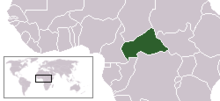|
LGBTQ rights in the Central African Republic
Lesbian, gay, bisexual, transgender, and queer (LGBTQ) people in the Central African Republic face legal and social challenges not experienced by non-LGBTQ residents. Both male and female types of same-sex sexual activity are legal in the Central African Republic, but LGBTQ persons still face discrimination among the broader population. The Central African Republic was one of the few African states that signed a "joint statement on ending acts of violence and related human rights violations based on sexual orientation and gender identity" at the United Nations, condemning violence and discrimination against LGBTQ people. Laws regarding same-sex sexual activitySame-sex sexual activity is legal. However, according to the U.S. Department of State's 2012 human rights report,[1]
Recognition of same sex relationshipsThere is no legal recognition of same-sex couples. Same-sex marriage is constitutionally banned as marriage is defined in Article 7 of the Constitution as "the union between one man and one woman ... Family and marriage are under the protection of the State."[2] Adoption and family planningAccording to a website of the French government, single and married people are eligible to adopt children. The website does not say whether single LGBTQ people are disqualified or not.[3] Living conditionsThe U.S. Department of State's 2012 Human Rights Report found that,[1]
Summary table
See alsoReferences
Information related to LGBTQ rights in the Central African Republic |
||||||||||||||||||||||||||||||||||||||||||||||||

